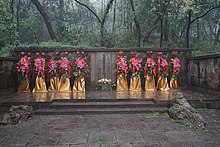Abing
[1] Abing was born on 17 August 1893, in the eastern Chinese city of Wuxi to father Hua Qinghe, who was a Taoist priest.
His mother was a widow, and her remarriage to a priest was resented by her family; she remained depressed and died a year after Abing's birth.
At age 17, Abing first performed in religious ceremonies, and won acclaim for his musical talent, presentation, and voice.
In 1939, he married Dong Cuidi (董 催 弟), a country widow in Jiangyin.
However, his musical current affairs commentary also irked the authorities, and after 1945 he was prohibited from singing about news items at his usual place of performance.
The recording brought Abing wider acclaim, and in September he was offered a teaching position with the Central Conservatory of Music.
He was only recorded very late in his life, but despite the scarcity of documentation of his music, he is nevertheless considered to be one of the most important Chinese musicians of the 20th Century.
[3] His signature pieces have become classics of Chinese erhu and pipa music, such as "Erquan Yingyue."

